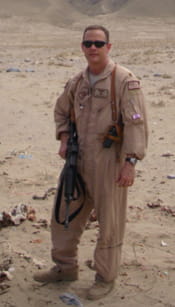
DEGREE EARNED: PhD in Applied Management and Decision Sciences (now PhD in Management) with a specialization in Engineering Management
HOW I PAID FOR IT: My tuition was subsidized by the federal government, USAF
HOW LONG IT TOOK: Five years, including two leaves of absence for deployments
WHAT I WAS DOING AT THE SAME TIME: After I was accepted at Walden in 2005, I volunteered to go to Iraq. When I came home, I began the program and completed Air War College for the U.S. Air Force. In 2008, I was assigned to a yearlong training and deployment mission to Afghanistan as the Commander for the Document and Weapons Exploitation Detachment. That is where I wrote the bulk of my dissertation.
WHERE I LIVED: In Afghanistan, I lived in what could only be described as half of a semi-truck trailer. It was extremely cramped, dark, and dusty, with a single window that I tried to keep closed to limit the dust flow. I slept on a metal cot—which actually was pretty comfortable after 16-hour days!
WHEN I STUDIED: I got up around 5:30 each morning to review the flow and progress of my dissertation before I reported to my office at 7. I would usually stay until close to midnight to research material or draft sections of my dissertation—but only when the mission allowed. For example, whenever there was insurgent activity—and this could happen weekly—the mission’s focus required all of my attention.
MOST CHALLENGING PART: Trying to work in a war zone. I was stationed at a base in Kabul, just outside the Green Zone. I remember my first night there; it was close to 1 a.m., and I was just starting to fall asleep. I heard machine-gun fire in the distance—it was daunting, but I came to accept this as routine, like crickets back home. I had to get used to the idea that attacks on your compound are a fact of life there. When our base was hit directly with a rocket attack, we had to take cover in hardened bunkers. During one attack, I suffered a torn rotator cuff from a fall—this made typing challenging and hampered both my mission responsibilities and dissertation progress.
HOW OTHERS HELPED ME: I had the unwavering motivation from my family and unconditional support of my dissertation committee. My family would send study packages—mostly snacks and pictures from home—and reference material as needed, and my committee members were willing to listen to ideas about my research at odd hours due to the time difference.
WHAT KEPT ME MOTIVATED: I wanted my children and my wife to be proud of the fact that I had attained a Ph.D. I wanted my parents to be similarly proud.
MY NEXT BIG CHALLENGE: I currently have a civilian assignment with the F-35 Joint Strike Fighter Program as enterprise data architect, procuring the next generation strike aircraft for the Department of Defense. When that ends, I will rejoin the Air Force Research Laboratory.
Tell us how you did it at [email protected].



